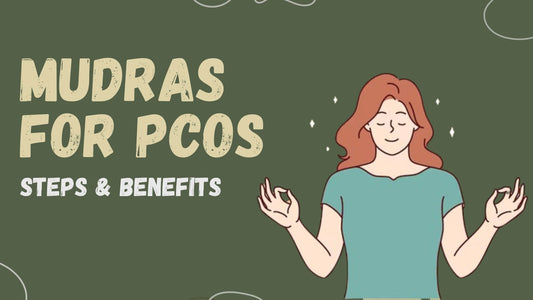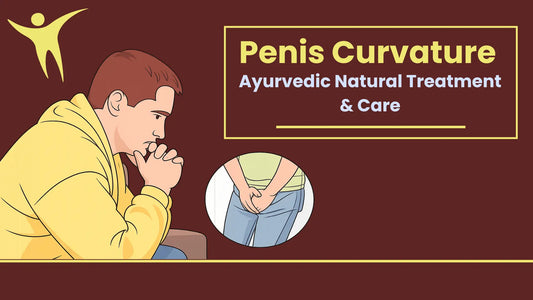
How Effective are Mudras for PCOS? Follow the Steps and Benefits
As per Ayurveda, PCOS is the result of an increase in pitta and kapha levels and increases the level of toxicity in the plasma and blood. As per the analysis of modern science, cysts develop in the area of the ovary due to irregularities in periods.
As the size of the ovary grows bigger, it does cause the release of androgen and estrogen. Such abnormal conditions in the body cause the release of eggs, and that makes the menstruation irregular.
Why Choose Ayurvedic mudra for PCOS?
Recovery is promising when you choose the Ayurvedic way. That's what about the mudras for PCOS.
Allopathic and surgical options may stimulate ovulation, reduce weight, and help in managing high blood sugar levels.
-
Can cause a relapse.
-
Increase side effects or physical complications.
-
Can be expensive.
-
There may not be a chance of full recovery of the problem.
On the contrary, Ayurvedic treatment will heal the PCOS problem from the root level and not cause any side effects.
Advantages of Practicing Mudras for PCOS
Mudras are understood as the movement of the eyes, hands, and body positions to facilitate energy throughout the body.
Performing any hand mudra for PCOS will help in:
-
Regulating energy in the body and bringing relief from poor mental health.
-
Further, you must allow yourself to sit in a vajrasana or padmasana position to practice the mudras and gain control over PCOS.
Most Powerful Mudras for PCOS Treatment
1. Usha Mudra

Almost everyone is familiar with this specific hand gesture, which helps in:
-
Lowering fatigue and sleepiness, which you usually feel in the early morning hours.
-
Regulating the estrogen and androgen levels in the females.
-
Lowering obesity.
-
Regulating menstruation.
This is how Usha mudra for hormonal imbalance in females helps.
Steps of practicing Usha mudra
-
You will be clasping the hands together behind your scalp.
-
Taking deep breaths several times.
2. Vayu Mudra

The steps of practicing it are:
-
Fold your index finger towards your hand palm.
-
Keep pressing your thumb with the index finger.
This hand mudra for PCOS will:
-
Regulate the periods.
-
Balance hormones and
-
Stimulate ojas and bring relief from stress.
3. Gyan Mudra

How to practice it?
-
Sit in a meditative posture.
-
Keep your hands on both knees with your palms open.
-
Join the index and thumb fingers.
This yogi mudra for PCOS will:
-
It will stimulate pituitary glands in releasing hormones for managing periods.
-
Bringing relief from stress.
-
Control the development of cysts in the ovary.
4. Prithvi Mudra

Another one of the popular mudras for PCOS is Prithvi, known for bringing excellent recovery results.
Steps of practicing Prithvi Mudra
-
Arranging yourself to sit in a stress-free way
-
Keep your hands on the thighs.
-
Either on one thigh or both the thighs, you can practice the posture by connecting the ring finger with the thumb finger.
-
Make sure that you keep pressing both the ring finger and thumb finger with each other.
Prthvi mudra will reverse PCOS suffering by:
-
It stimulates the flow of female reproductive hormones.
-
Regulating the menses.
-
Relieving stress.
5. Prana Mudra

As one of the revitalizing mudras for PCOS, you can do Prana anytime of the day.
Steps of performing prana
-
Sitting in a relaxed position.
-
Keeping your hands straight with palms open.
-
Join the thumb finger, ring finger, and little finger at the tips.
-
Pressing them at the tips together.
Benefits of this hand mudra for curing PCOS
-
Easy to perform like the rest of the above-mentioned mudras.
-
Take a deep breath and
-
Relax and calm down your mind.
6. Linga Mudra

A certified yoga trainer may also suggest you do linga mudra with your two hands. It is also one of the purposeful mudras for PCOS.
Method of performing linga mudra
-
Standing or sitting in a meditative posture.
-
Joining and clasping the fingers apart from raising the left thumb and encircling with the right thumb and right index finger.
-
Taking a deep breath
-
Need to practice after every 20 minutes.
Advantages of performing this mudra
-
Facilitate warmth in the body
-
Lower down the elevated kapha dosha.
-
Normalize the blood pressure and regulate the menstrual cycle.
-
Bring relief from stress and obesity.
Complementing Mudras with a Balanced Diet for PCOS
For further information on mudras for PCOS, you can take guidance from any
Ayurvedic yoga expert. There is a need to check the release of excess male hormones that result in ovulation disorders and cause PCOS.
Ayush for Women is made from rejuvenating and anti-aging properties rich herbs like ashoka, nirgundi, lodhra, salai guggal, and aloe vera, etc. With the daily intake of capsules of this Ayurvedic product, you can experience recovery in the following ways:
-
Controlling menstrual cramps.
-
Reducing abdominal and back pain.
-
Balancing female hormones in the body.
-
Regulating menstrual bleeding and controlling excess bleeding from the uterus
-
Not causing any side effects.
Consulting any Ayurvedic physicians will help you find the specific food items to heal your infertility conditions by determining your prakriti.
A balanced meal with a combination of proteins, carbohydrates, fiber, vitamins, and minerals will definitely stimulate the reproductive organs of females, help them to bear babies naturally, and boost healthy growth of the fetus and postpartum period.
So apart from practicing mudras for PCOS, you can include the following food items for managing menstrual cramps and irregularities in periods:
-
Conjugated and iodinated proteins: seeds, pulses, wholegrain cereals, eggs, fish, and chicken
-
Unsaturated fats: walnuts, peanuts, raisins, and cashews.
-
Low-glycemic and fiber-rich diet: black grams, brown rice, oatmeal, and green leafy vegetables.
-
Colorful antioxidant fruits: blueberries, blackberries, cherries, strawberries, papaya, and red grapes will lower the menstrual cramps and high blood sugar and cholesterol levels.
-
Drinks That Help With Period Cramps: Herbal teas like ginger or chamomile tea can also provide relief from cramps and support overall menstrual health.
To gain energy and nutrients in the body, you must make sure to combine the vitamins and proteins with carbohydrates and fats in an appropriate way.
In these ways, you can conquer the PCOD issues and stay away from modern fertility or IVF treatment for becoming pregnant.
Conclusion
PCOS relates to irregular and painful periods followed with cramps and the development of cysts in the ovary. There is no exact cure for this disease or condition, which can prevent natural pregnancy.
However, different hand gestures or mudras for PCOS can bring chances of relief from infertility by regulating the periods, balancing reproductive hormones, and reducing obesity.
Further, incorporating a balanced diet rich in the combination of protein, vitamins, carbohydrates, and different minerals will surely show excellent revitalizing results.
F.A.Q.
Q1. Which mudra is good for PCOS?
Ans: You can practice vayu mudra by bending your index finger towards the thumb and pressing it with the thumb of any hand several times a day.
Q2. Which mudra is best for hormonal imbalance?
Ans: Usha Mudra is effective for managing hormonal imbalance. Simply lie on your back, clasp your hands behind your head, and take deep breaths for about 20 minutes in the morning. This mudra helps regulate the menstrual cycle and balance reproductive hormones.
Q3. Can PCOS be cured with yoga?
Ans: Yoga cannot claim to cure PCOD, yet there are simple hand mudras that can surely lower its symptoms.
Q4. Which mudra is best for PCOS?
Ans: The most simple and effective is vayu mudra for PCOS. You can do it by opening your hand and bending the index finger towards the palm and pressing the index finger with the thumb finger for excellent recovery results.
Q5. Which mudra for hormone imbalance?
Ans: Either you can choose vayu mudra, usha mudra, or prithvi mudra for hormonal imbalance. For further information, you can get in touch with the yoga expert.
References
- Nidhi R, Padmalatha V, Nagarathna R, Ram A. Effect of a yoga program on endocrine parameters, quality of life, and ovarian morphology in women with polycystic ovary syndrome: A randomized controlled trial. J Altern Complement Med. 2020;26(12):1115–1122. Available from: https://www.ncbi.nlm.nih.gov/pmc/articles/PMC10775836/
- Ravindra K, Patil S. Effect of Yoga therapy on hormonal imbalance in women with PCOS: A clinical study. Int J Ayurveda Med Sci. 2023;8(2):112-117. Available from: https://www.ijam.co.in/index.php/ijam/article/view/3357
- Rathi N, Dabas A. Effect of yoga on polycystic ovarian syndrome: A systematic review. Int J Yoga. 2021;14(3):220–227. Available from: https://pubmed.ncbi.nlm.nih.gov/34391246/
- Singh R, Mishra N. Ayurvedic approaches to holistic management of polycystic ovary syndrome: A narrative review. J Ayurveda Integr Med. 2024. Available from: https://www.ncbi.nlm.nih.gov/pmc/articles/PMC11805180/
- Shukla V, Tripathi A. Clinical efficacy of Ayurveda treatment regimen on subfertility with PCOS: A case study. Ayu. 2011;32(4):575–577. Available from: https://www.ncbi.nlm.nih.gov/pmc/articles/PMC3215317/
- Patwardhan B, Joshi K. A scoping review of Ayurveda studies in women with polycystic ovary syndrome. J Ayurveda Integr Med. 2023. Available from: https://pubmed.ncbi.nlm.nih.gov/36944117/
- Patel V, et al. Regular mindful yoga practice as a method to improve androgen levels in women with polycystic ovary syndrome: A randomized, controlled trial. J Am Osteopath Assoc. 2020;120(4):243–250. Available from: https://pubmed.ncbi.nlm.nih.gov/32285088/
- Patil AD, et al. Yoga intervention improves the metabolic parameters and quality of life among infertile women with polycystic ovary syndrome in Indian population. Int J Yoga. 2023;16(2):98–105. Available from: https://www.ncbi.nlm.nih.gov/pmc/articles/PMC10775836/
- Sharma P, Mishra N. Ayurveda management of infertility associated with polycystic ovarian syndrome: A case report. J Ayurveda Integr Med. 2022;13(1):100–103. Available from: https://www.ncbi.nlm.nih.gov/pmc/articles/PMC8814398/

Dr. Meghna
Dr. Meghna is a skilled General Ayurveda Physician, full of passion and devotion for integral health that can be seen through work. She has expertise in both men's and women's health and focuses more on infertility and sexual health disorders. She brings together the ancient Ayurvedic practice and modern wellness approaches for effective holistic treatment of patients.



